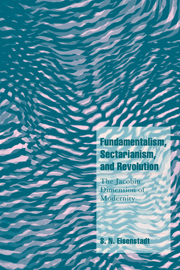Book contents
- Frontmatter
- Contents
- Preface
- 1 Heterodoxies, sectarianism, and utopianism in the constitution of proto-fundamentalist movements
- 2 The Great Revolutions and the transformation of sectarian utopianism in the cultural and political program of modernity
- 3 Fundamentalism as a modern Jacobin anti-modern utopia and heterodoxy – the totalistic reconstruction of tradition
- 4 Historical setting and variability of fundamentalist movements
- 5 Some considerations on modernity
- Notes
- Select bibliography
- Index
5 - Some considerations on modernity
Published online by Cambridge University Press: 30 September 2009
- Frontmatter
- Contents
- Preface
- 1 Heterodoxies, sectarianism, and utopianism in the constitution of proto-fundamentalist movements
- 2 The Great Revolutions and the transformation of sectarian utopianism in the cultural and political program of modernity
- 3 Fundamentalism as a modern Jacobin anti-modern utopia and heterodoxy – the totalistic reconstruction of tradition
- 4 Historical setting and variability of fundamentalist movements
- 5 Some considerations on modernity
- Notes
- Select bibliography
- Index
Summary
The preceding analysis of the Jacobin component in modern fundamentalist movements, and the place of these movements among other modern social movements and in the discourse of modernity, attests not only to the modern characteristics of these movements, but also sheds some light on some basic features of modernity, on modern cultural programs, and on modern civilization. This analysis attests to both the multiplicity of modern cultural programs and to their continuous dynamics. Indeed, as we are approaching the end of the twentieth century, new visions and understandings of modernity and of modern civilization are emerging throughout the world, be it in the West – Europe, the United States – where the first cultural program of modernity developed, or among Asian, Latin American, and African societies. All these developments demand a far-reaching reappraisal of the classical visions of modernity and modernization.
Such a reappraisal should be based on several considerations. It should be based first of all on the recognition that the expansion of modernity has to be viewed as the crystallization of a new type of civilization – not unlike the expansion of Great Religions, or great Imperial expansions in past times. However, because the expansion of this civilization almost always and continually combined economic, political, and ideological aspects and forces to a much larger extent, its impact on the societies to which it spread was much more intense than in most historical cases.
This expansion indeed spawned a tendency – practically unique in the history of mankind – to the development of universal, worldwide institutional and symbolic frameworks and systems.
- Type
- Chapter
- Information
- Fundamentalism, Sectarianism, and RevolutionThe Jacobin Dimension of Modernity, pp. 196 - 207Publisher: Cambridge University PressPrint publication year: 2000



